仁爱版英语七年级下册Unit 5 Our school life Topic 3 My school life is very interesting.基础巩固与复习课件 (共20张PPT)
文档属性
| 名称 | 仁爱版英语七年级下册Unit 5 Our school life Topic 3 My school life is very interesting.基础巩固与复习课件 (共20张PPT) |  | |
| 格式 | zip | ||
| 文件大小 | 4.0MB | ||
| 资源类型 | 教案 | ||
| 版本资源 | 仁爱科普版 | ||
| 科目 | 英语 | ||
| 更新时间 | 2020-05-27 12:32:07 | ||
图片预览


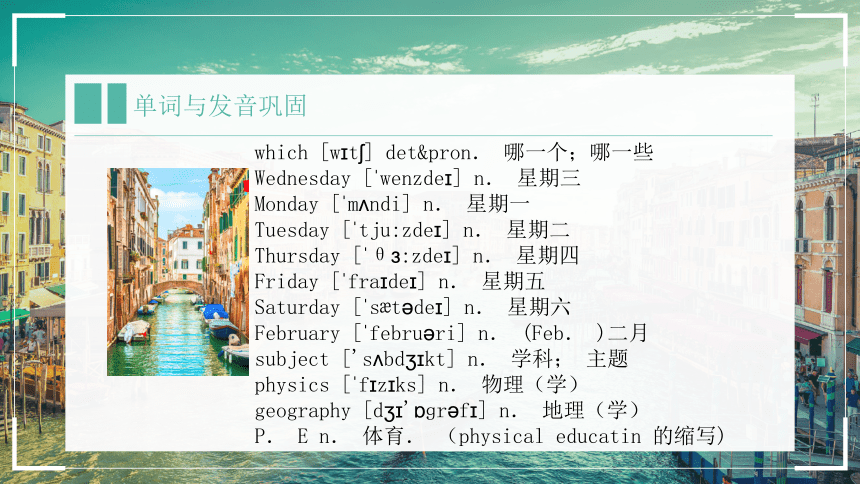
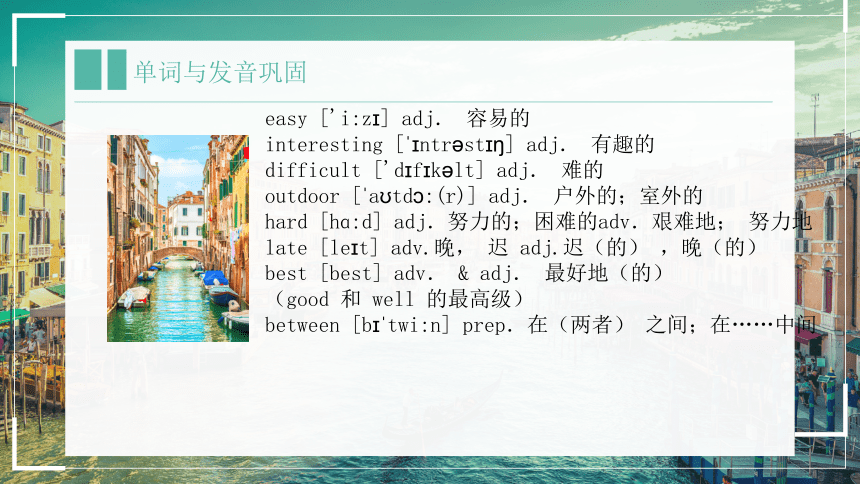
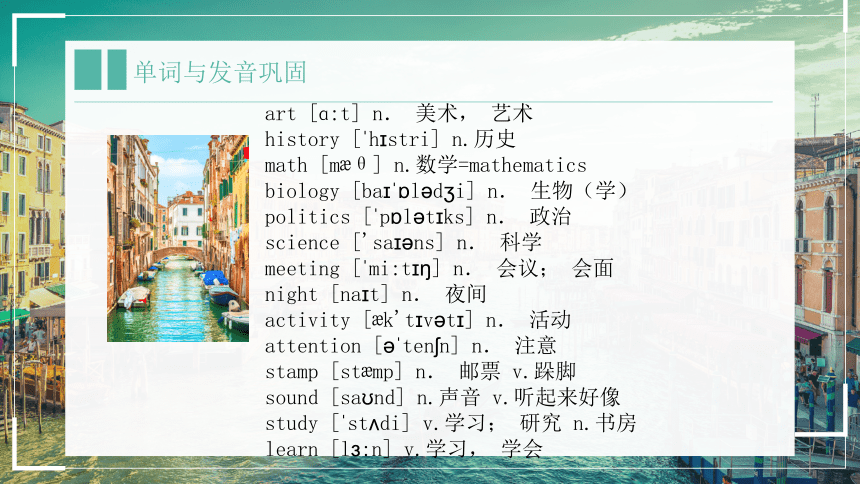
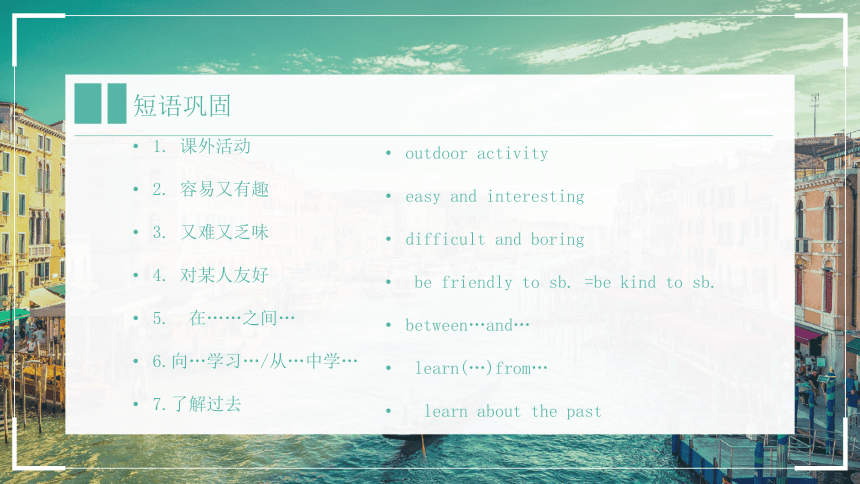

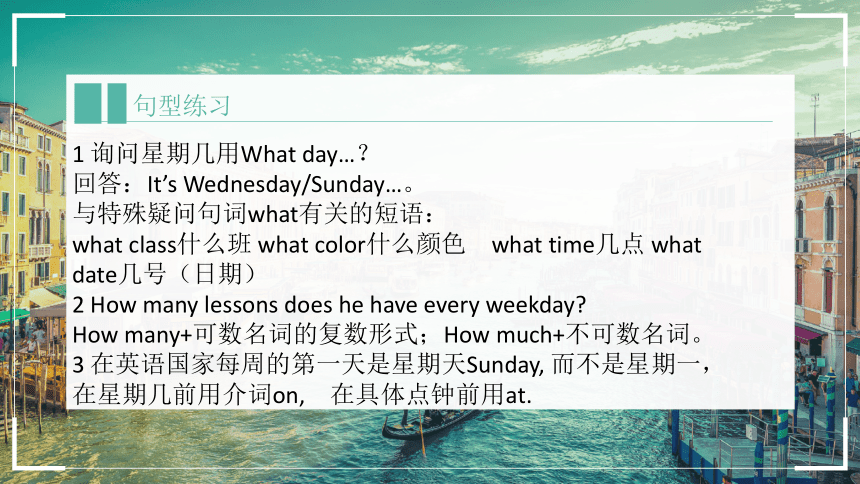
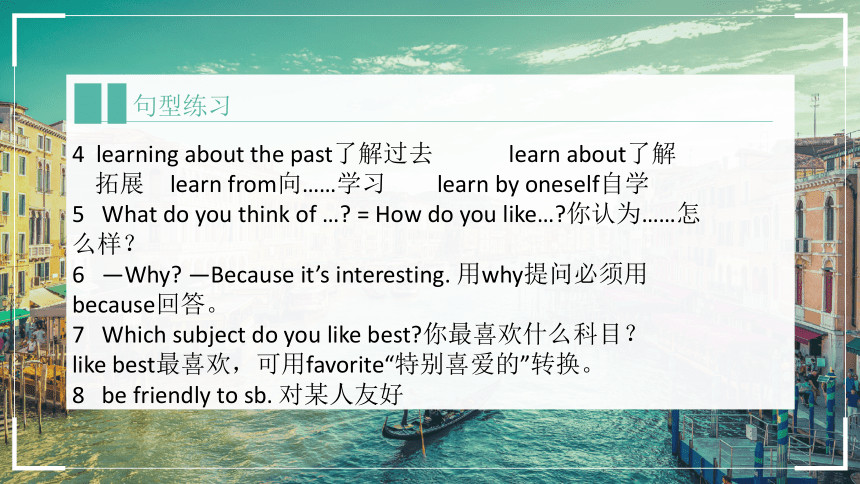
文档简介
(共20张PPT)
话题巩固复习
Topic
2
A
few
students
are
running
around
the
playground.
Unit
5
Our
School
Life
本节目录
Unit
5
Topic
3
单词
单词的发音和词性巩固
短语
归纳不同的短语类型
句型
句型回顾
现在进行时和一般现在时比较
单词与发音巩固
which
[w?t?]
det&pron.
哪一个;哪一些
Wednesday
[?wenzde?]
n.
星期三
Monday
[?m?ndi]
n.
星期一
Tuesday
[?tju:zde?]
n.
星期二
Thursday
[?θ?:zde?]
n.
星期四
Friday
[?fra?de?]
n.
星期五
Saturday
[?s?t?de?]
n.
星期六
February
[?febru?ri]
n.
(Feb.
)二月
subject
['s?bd??kt]
n.
学科;
主题
physics
[?f?z?ks]
n.
物理(学)
geography
[d??'?ɡr?f?]
n.
地理(学)
P.
E
n.
体育.
(physical
educatin
的缩写)
单词与发音巩固
easy
['i:z?]
adj.
容易的
interesting
[??ntr?st??]
adj.
有趣的
difficult
['d?f?k?lt]
adj.
难的
outdoor
[?a?td?:(r)]
adj.
户外的;室外的
hard
[hɑ:d]
adj.努力的;困难的adv.艰难地;
努力地
late
[le?t]
adv.晚,
迟
adj.迟(的)
,晚(的)
best
[best]
adv.
&
adj.
最好地(的)
(good
和
well
的最高级)
between
[b??twi:n]
prep.在(两者)
之间;在……中间
单词与发音巩固
art
[ɑ:t]
n.
美术,
艺术
history
[?h?stri]
n.历史
math
[m?θ]
n.数学=mathematics
biology
[ba???l?d?i]
n.
生物(学)
politics
[?p?l?t?ks]
n.
政治
science
['sa??ns]
n.
科学
meeting
[?mi:t??]
n.
会议;
会面
night
[na?t]
n.
夜间
activity
[?k't?v?t?]
n.
活动
attention
[??ten?n]
n.
注意
stamp
[st?mp]
n.
邮票
v.跺脚
sound
[sa?nd]
n.声音
v.听起来好像
study
[?st?di]
v.学习;
研究
n.书房
learn
[l?:n]
v.学习,
学会
短语巩固
1.?课外活动????
2.?容易又有趣??
3.?又难又乏味???
4.?对某人友好
5.?
在……之间…????
6.向…学习…/从…中学…
7.了解过去
outdoor
activity
easy
and
interesting
difficult
and
boring
?be
friendly
to
sb.
=be
kind
to
sb.?
between…and…
?learn(…)from…
??learn
about
the
past
短语巩固
8.?了解
9.自学
10.在星期一的早上
11.告诉某人关于某事????
12.从……到……???
13.?在早上/
下午/
晚上
14.在星期一????
learn
about
?learn
by
oneself
?on
Monday
morning?
tell
sb.
about
sth
from…to…
?in
the
morning
/
afternoon
/
evening?
?on
Monday
句型练习
1?询问星期几用What
day…?
回答:It’s
Wednesday/Sunday…。
与特殊疑问句词what有关的短语:
what
class什么班?what
color什么颜色 what
time几点?what
date几号(日期)
2
How
many
lessons
does
he
have
every
weekday?
How
many+可数名词的复数形式;How
much+不可数名词。
3?在英语国家每周的第一天是星期天Sunday,?而不是星期一,在星期几前用介词on, 在具体点钟前用at.
句型练习
4
?learning
about?the
past了解过去 learn
about了解
????拓展 learn
from向……学习 learn
by
oneself自学
5
??What
do
you
think
of
…?
=
How
do
you
like…?你认为……怎么样?
6
??—Why?
—Because
it’s
interesting.?用why提问必须用because回答。
7
??Which
subject
do
you
like
best?你最喜欢什么科目?
like
best最喜欢,可用favorite“特别喜爱的”转换。
8
??be
friendly
to
sb.?对某人友好
?
9
??I?can
learn
a
lot
from
it.我能从中学到很多东西。
????(1)
learn…from“从……学习”。
????(2)
a
lot
=
much“许多”,后接宾语时要说a
lot
of?也可以表示“非常,十分”。
1.
--___________________________________???
--It’s
Sunday.
2.
--?___________________________________???
???
--They
are
having
a
music
class.
3.
--____________________________(问上课时间)???
?
--At
ten
o’clock.
4.--___________________________________???
/
___________________________________???
你认为数学怎么样????
--It’s
difficult
and
boring.
What
day
is
it
today?
What
class
are
they
having?
What
time
does
the
class
begin???
What
do
you
think
of
math??
How
do
you
like
math
?
5.
--__________________like
English
??????
--Because(因为)it’s
easy
and
interesting.
7.--??___________________________________???
--I
like
history
best.
8.?___________________________________?
?___________________________________?
在学校,我的老师和同学对我很友好。
Whydo
you
What
subject
do
you
like
best
??
At
school,
my
teachers
and
classmates
are
very
friendly
to
me.
9.?___________________________________?
?___________________________________?
我学习语文、英语、政治、地理以及其他一些科目。
(other泛指其他的,别的+
名词复数。?
another
泛指又一个、再一个、另一个+名词单数。
the
other
两者中的另一个。)
?I
study
Chinese,
English,
politics,
geography
and
some
other
subjects.
10.
___________________________________?
英语是我最喜欢的科目。
11.
___________________________________?/
___________________________________?
我也喜欢体育和音乐。(也)
12.
___________________________________?
你能给我讲讲吗??
English
is
my
favorite
subject.
I
also
like
P.E
and
music.
I
like
P.E
and
music
,
too.
Can
you
tell
me
something
about
it?
“一般现在时”对比“现在进行时”
一、
基本用法不同
1.一般现在时表示经常发生的动作或存在的状态。
e.g.My
brother
takes
a
bus
to
school
every
day.
我弟弟每天乘公共汽车去上学。
2.
现在进行时表示此时或现阶段正在发生的动作。
e.g.My
brother
is
taking
a
bus
to
school
now.
我弟弟正乘公共汽车去上学。
二、
谓语动词形式的不同
1.
一般现在时中谓语动词的构成有以下两种情况:
(1)
be
动词的一般现在时有
am,
is,
are
三种变化;
(2)实义动词的一般现在时有动词原形或第三人称单数两种形式。
e.g.
I
am
from
China,
and
Lily
is
from
Canada.
我来自
中国,
莉莉来自
加拿大。
Jim
likes
Geography
but
I
like
English.
吉姆喜欢地理,
但我喜欢英语。
情态动词can的一般疑问句和选择疑问句
2.
现在进行时是由“be+
v
-i
ng”构成,
其中
be
(am,
is,
are)
的形式由主语决定。
e.g.
What
are
you
you
doing
now?
你们现在正在做什么?
I
am
having
dinner.我正在吃晚饭。
三、
时间状语不同
1.
一般现在时常与
always,
often,
usually,
sometimes
等频度副词连用,
也可以与
in
the
morning,
every
day,
on
weekends
等时间状语连用。
2.
现在进行时常与
now,
at
this
time,
these
days
等时
间状语连用,
也可以用
look,
listen
等动词来表明时态。
Summary
本节内容
Unit
5
Topic
3
单词
单词的发音和词性巩固
短语
归纳不同的短语类型
句型
句型回顾
现在进行时和一般现在时比较
Thank
you.
话题巩固复习
Topic
2
A
few
students
are
running
around
the
playground.
Unit
5
Our
School
Life
本节目录
Unit
5
Topic
3
单词
单词的发音和词性巩固
短语
归纳不同的短语类型
句型
句型回顾
现在进行时和一般现在时比较
单词与发音巩固
which
[w?t?]
det&pron.
哪一个;哪一些
Wednesday
[?wenzde?]
n.
星期三
Monday
[?m?ndi]
n.
星期一
Tuesday
[?tju:zde?]
n.
星期二
Thursday
[?θ?:zde?]
n.
星期四
Friday
[?fra?de?]
n.
星期五
Saturday
[?s?t?de?]
n.
星期六
February
[?febru?ri]
n.
(Feb.
)二月
subject
['s?bd??kt]
n.
学科;
主题
physics
[?f?z?ks]
n.
物理(学)
geography
[d??'?ɡr?f?]
n.
地理(学)
P.
E
n.
体育.
(physical
educatin
的缩写)
单词与发音巩固
easy
['i:z?]
adj.
容易的
interesting
[??ntr?st??]
adj.
有趣的
difficult
['d?f?k?lt]
adj.
难的
outdoor
[?a?td?:(r)]
adj.
户外的;室外的
hard
[hɑ:d]
adj.努力的;困难的adv.艰难地;
努力地
late
[le?t]
adv.晚,
迟
adj.迟(的)
,晚(的)
best
[best]
adv.
&
adj.
最好地(的)
(good
和
well
的最高级)
between
[b??twi:n]
prep.在(两者)
之间;在……中间
单词与发音巩固
art
[ɑ:t]
n.
美术,
艺术
history
[?h?stri]
n.历史
math
[m?θ]
n.数学=mathematics
biology
[ba???l?d?i]
n.
生物(学)
politics
[?p?l?t?ks]
n.
政治
science
['sa??ns]
n.
科学
meeting
[?mi:t??]
n.
会议;
会面
night
[na?t]
n.
夜间
activity
[?k't?v?t?]
n.
活动
attention
[??ten?n]
n.
注意
stamp
[st?mp]
n.
邮票
v.跺脚
sound
[sa?nd]
n.声音
v.听起来好像
study
[?st?di]
v.学习;
研究
n.书房
learn
[l?:n]
v.学习,
学会
短语巩固
1.?课外活动????
2.?容易又有趣??
3.?又难又乏味???
4.?对某人友好
5.?
在……之间…????
6.向…学习…/从…中学…
7.了解过去
outdoor
activity
easy
and
interesting
difficult
and
boring
?be
friendly
to
sb.
=be
kind
to
sb.?
between…and…
?learn(…)from…
??learn
about
the
past
短语巩固
8.?了解
9.自学
10.在星期一的早上
11.告诉某人关于某事????
12.从……到……???
13.?在早上/
下午/
晚上
14.在星期一????
learn
about
?learn
by
oneself
?on
Monday
morning?
tell
sb.
about
sth
from…to…
?in
the
morning
/
afternoon
/
evening?
?on
Monday
句型练习
1?询问星期几用What
day…?
回答:It’s
Wednesday/Sunday…。
与特殊疑问句词what有关的短语:
what
class什么班?what
color什么颜色 what
time几点?what
date几号(日期)
2
How
many
lessons
does
he
have
every
weekday?
How
many+可数名词的复数形式;How
much+不可数名词。
3?在英语国家每周的第一天是星期天Sunday,?而不是星期一,在星期几前用介词on, 在具体点钟前用at.
句型练习
4
?learning
about?the
past了解过去 learn
about了解
????拓展 learn
from向……学习 learn
by
oneself自学
5
??What
do
you
think
of
…?
=
How
do
you
like…?你认为……怎么样?
6
??—Why?
—Because
it’s
interesting.?用why提问必须用because回答。
7
??Which
subject
do
you
like
best?你最喜欢什么科目?
like
best最喜欢,可用favorite“特别喜爱的”转换。
8
??be
friendly
to
sb.?对某人友好
?
9
??I?can
learn
a
lot
from
it.我能从中学到很多东西。
????(1)
learn…from“从……学习”。
????(2)
a
lot
=
much“许多”,后接宾语时要说a
lot
of?也可以表示“非常,十分”。
1.
--___________________________________???
--It’s
Sunday.
2.
--?___________________________________???
???
--They
are
having
a
music
class.
3.
--____________________________(问上课时间)???
?
--At
ten
o’clock.
4.--___________________________________???
/
___________________________________???
你认为数学怎么样????
--It’s
difficult
and
boring.
What
day
is
it
today?
What
class
are
they
having?
What
time
does
the
class
begin???
What
do
you
think
of
math??
How
do
you
like
math
?
5.
--__________________like
English
??????
--Because(因为)it’s
easy
and
interesting.
7.--??___________________________________???
--I
like
history
best.
8.?___________________________________?
?___________________________________?
在学校,我的老师和同学对我很友好。
Whydo
you
What
subject
do
you
like
best
??
At
school,
my
teachers
and
classmates
are
very
friendly
to
me.
9.?___________________________________?
?___________________________________?
我学习语文、英语、政治、地理以及其他一些科目。
(other泛指其他的,别的+
名词复数。?
another
泛指又一个、再一个、另一个+名词单数。
the
other
两者中的另一个。)
?I
study
Chinese,
English,
politics,
geography
and
some
other
subjects.
10.
___________________________________?
英语是我最喜欢的科目。
11.
___________________________________?/
___________________________________?
我也喜欢体育和音乐。(也)
12.
___________________________________?
你能给我讲讲吗??
English
is
my
favorite
subject.
I
also
like
P.E
and
music.
I
like
P.E
and
music
,
too.
Can
you
tell
me
something
about
it?
“一般现在时”对比“现在进行时”
一、
基本用法不同
1.一般现在时表示经常发生的动作或存在的状态。
e.g.My
brother
takes
a
bus
to
school
every
day.
我弟弟每天乘公共汽车去上学。
2.
现在进行时表示此时或现阶段正在发生的动作。
e.g.My
brother
is
taking
a
bus
to
school
now.
我弟弟正乘公共汽车去上学。
二、
谓语动词形式的不同
1.
一般现在时中谓语动词的构成有以下两种情况:
(1)
be
动词的一般现在时有
am,
is,
are
三种变化;
(2)实义动词的一般现在时有动词原形或第三人称单数两种形式。
e.g.
I
am
from
China,
and
Lily
is
from
Canada.
我来自
中国,
莉莉来自
加拿大。
Jim
likes
Geography
but
I
like
English.
吉姆喜欢地理,
但我喜欢英语。
情态动词can的一般疑问句和选择疑问句
2.
现在进行时是由“be+
v
-i
ng”构成,
其中
be
(am,
is,
are)
的形式由主语决定。
e.g.
What
are
you
you
doing
now?
你们现在正在做什么?
I
am
having
dinner.我正在吃晚饭。
三、
时间状语不同
1.
一般现在时常与
always,
often,
usually,
sometimes
等频度副词连用,
也可以与
in
the
morning,
every
day,
on
weekends
等时间状语连用。
2.
现在进行时常与
now,
at
this
time,
these
days
等时
间状语连用,
也可以用
look,
listen
等动词来表明时态。
Summary
本节内容
Unit
5
Topic
3
单词
单词的发音和词性巩固
短语
归纳不同的短语类型
句型
句型回顾
现在进行时和一般现在时比较
Thank
you.
同课章节目录
- Unit 5 Our school life
- Topic 1 I usually come to school by subway.
- Topic 2 A few students are running around the play
- Topic 3 My school life is very interesting.
- Unit 6 Our local area
- Topic 1 Is there a computer in your study?
- Topic 2 My home is in an apartment building.
- Topic 3 Which is the way to the hospital?
- Review of Units 5-6
- Unit 7 The Birthday
- Topic 1 When is your birthday?
- Topic 2 Can you sing an English song?
- Topic 3 Everyone had a good time.
- Unit 8 The seasons and the Weathe
- Topic 1 What's the weather like in summer?
- Topic 2 The summer holidays are coming.
- Topic 3 Let’s celebrate!
- Review of Units 7-8
- 旧版资料
- Unit 5 Our School Life
- Unit 6 Our Local Area
- Unit 7 The Birthday
- Unit 8 The seasons and the Weathe
- Unit 7 Celebrating the Birthday(老版本)
